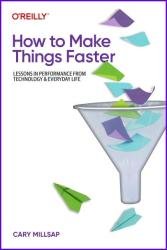How to Make Things Faster
- Добавил: literator
- Дата: 10-06-2023, 07:48
- Комментариев: 0
 Название: How to Make Things Faster: Lessons in Performance from Technology and Everyday Life
Название: How to Make Things Faster: Lessons in Performance from Technology and Everyday LifeАвтор: Cary Millsap
Издательство: O’Reilly Media, Inc.
Год: 2023
Страниц: 286
Язык: английский
Формат: pdf, epub (true)
Размер: 10.2 MB
Slow systems are frustrating. They waste time and money. But making consistently great decisions about performance can be easy, if you understand what's going on. This book explains in a clear and thoughtful voice why systems perform the way they do. It's for anybody who's curious about how computer programs and other processes use their time and about what you can do to improve them.
Through a mix of personal vignettes and technical use cases, Cary Millsap reviews the process of improving performance and provides best practices for optimizing systems efficiently. You'll learn how to identify the information needed to improve a system, how to find the root causes of performance issues, and how to fix them. You'll also learn how performance optimization is both a skill set and a mindset, and how to develop both over time.
If you're a computer professional whose success relies on software that goes fast, by the end of this book you'll be able to identify, view, scope, analyze, and remedy performance issues with consistency and confidence.
Making things faster is about making things better. Making life better. The faster your tools can work, the more time you have for doing the things you want to be doing. If your tools help you process information, then the faster they work, the better decisions you can make. Optimizing—whether a computer, or a plow, or anything in between—requires two separate skill sets: one, asking the right questions; and two, of course, answering those questions. Most people who think about optimizing are well aware of this second skill set. Fewer seem aware of the first one. But this first one—the mere act of asking the right questions—is the skill you need to develop first, especially if you’re a leader. You might be surprised at how quickly you’ll be able to learn it.
There’s a problem, though. The questions I’ll teach you to ask are simple. But anyone who’s ever met an inquisitive child knows that simple questions aren’t always easy to answer. For example, the people who look after your company’s computer may know exactly what the system’s CPU utilization looks like at 2:00 p.m. on a given Friday, but they may not be able to answer how long it takes a clerk to enter an order. There’s a mismatch between the answers they’ll want to give and the questions you’ll want to ask. This mismatch itself hides opportunities to make things faster. I’ll teach you how to find them.
Optimizing is often more political than technical. It’s curious, then, that books about optimizing are almost always only technical. It’s easy for technical people to regard the nontechnical elements of a project as unnecessary and maybe even ridiculous disruptions. But the fact is, the nontechnical aspects of optimizing require understanding and effort, just like the technical aspects do. To optimize something, sometimes you have to confront the monsters created by panic and fear, in addition to being productive technically. A strong track record of successes will help you win debates about what to do next, but you’ll never be able to create that track record without exercising some political savvy.
My goal with this book is to help you improve both kinds of skills: the asking and the answering, the political and the technical. The payoff potential is huge. When you understand both the science of performance and the art of navigating the desires and emotions of the people who care about it, then you can optimize anything.
Скачать How to Make Things Faster
[related-news] [/related-news]
Внимание
Уважаемый посетитель, Вы зашли на сайт как незарегистрированный пользователь.
Мы рекомендуем Вам зарегистрироваться либо войти на сайт под своим именем.
Уважаемый посетитель, Вы зашли на сайт как незарегистрированный пользователь.
Мы рекомендуем Вам зарегистрироваться либо войти на сайт под своим именем.
